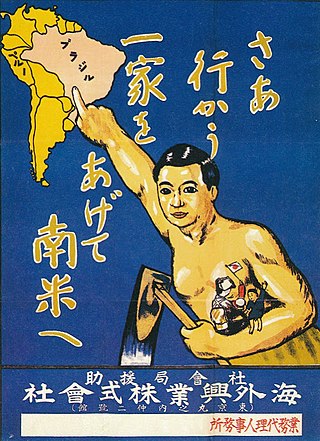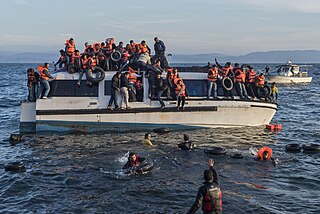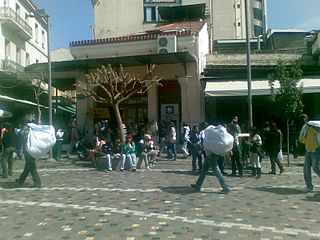Related Research Articles

Immigration to the United States has been a major source of population growth and cultural change throughout much of its history. In absolute numbers, the United States has by far the highest number of immigrants in the world, with 50,661,149 people as of 2019. This represents 19.1% of the 244 million international migrants worldwide, and 14.4% of the United States' population. In 2018, there were almost 90 million immigrants and U.S.-born children of immigrants in the United States, accounting for 28% of the overall U.S. population.

A victimless crime is an illegal act that typically either directly involves only the perpetrator or occurs between consenting adults. Because it is consensual in nature, whether there involves a victim is a matter of debate. Definitions of victimless crimes vary in different parts of the world and different law systems, but usually include possession of any illegal contraband, recreational drug use, prostitution and prohibited sexual behavior between consenting adults, assisted suicide, and smuggling among other similar infractions.

Emigration is the act of leaving a resident country or place of residence with the intent to settle elsewhere. Conversely, immigration describes the movement of people into one country from another. A migrant emigrates from their old country, and immigrates to their new country. Thus, both emigration and immigration describe migration, but from different countries' perspectives.

Human migration is the movement of people from one place to another, with intentions of settling, permanently or temporarily, at a new location. The movement often occurs over long distances and from one country to another, but internal migration is the dominant form of human migration globally.

Deportation is the expulsion of a person or group of people from a territory. The actual definition changes depending on the place and context, and it also changes over time. Forced displacement or forced migration of an individual or a group may be caused by deportation, for example ethnic cleansing, and other reasons. A person who has been deported or is under sentence of deportation is called a deportee.

Forced displacement is an involuntary or coerced movement of a person or people away from their home or home region. The UNHCR defines 'forced displacement' as follows: displaced "as a result of persecution, conflict, generalized violence or human rights violations".
Since 1945, immigration to the United Kingdom, controlled by British immigration law and to an extent by British nationality law, has been significant, in particular from the former territories of the British Empire and the European Union.

Immigration is the international movement of people to a destination country of which they are not usual residents or where they do not possess nationality in order to settle as permanent residents. Commuters, tourists, and other short-term stays in a destination country do not fall under the definition of immigration or migration; seasonal labour immigration is sometimes included, however.

Migration Watch UK is a British think-tank and campaign group which argues for lower immigration into the United Kingdom. Founded in 2001, the group believes that international migration places undue demand on limited resources and that the current level of immigration is not sustainable.
Illegal immigration, or unauthorized immigration, occurs when foreign nationals, known as aliens, violate US immigration laws by entering the United States unlawfully, or by lawfully entering but then remaining after the expiration of their visas, parole or temporary protected status.
African immigrants in Europe are individuals residing in Europe who were born in Africa. This includes both individuals born in North Africa and Sub-Saharan Africa.
Opposition to immigration, also known as anti-immigration, is a political ideology that seeks to restrict immigration. In the modern sense, immigration refers to the entry of people from one state or territory into another state or territory in which they are not citizens. Illegal immigration occurs when people immigrate to a country without having official permission to do so. Opposition to immigration ranges from calls for various immigration reforms, to proposals to completely restrict immigration, to calls for repatriation of existing immigrants.
Illegal immigration is the migration of people into a country in violation of that country's immigration laws, or the continuous residence in a country without the legal right to do so. Illegal immigration tends to be financially upward, from poorer to richer countries. Illegal residence in another country creates the risk of detention, deportation, and other imposed sanctions.

Immigration to Greece percentage of foreign populations in Greece is 7.1% in proportion to the total population of the country. Moreover, between 9 and 11% of the registered Greek labor force of 4.4 million are foreigners. Migrants additionally make up 25% of wage and salary earners.
Crime has been committed by immigrants, and people have sought to study the relationship between immigration and crime. This has controversially long been a subject of debate, and recently systematic empirical evidence on this issue has been brought to light that has encouraged political discourse on the matter.

Crime in Russia refers to the multivalent issues of organized crime, extensive political and police corruption, and all aspects of criminality at play in Russia. Violent crime in Siberia is much more apparent than in Western Russia.
Child migration or "children in migration or mobility" is the movement of people ages 3–18 within or across political borders, with or without their parents or a legal guardian, to another country or region. They may travel with or without legal travel documents. They may arrive to the destination country as refugees, asylum seekers, or economic migrants.
Harragas, sometimes spelled Haraga are North African migrants who illegally immigrate to Europe or to European-controlled islands sometimes in makeshift boats. The term Harraga literally means “to burn” alluding to the migrants practice of burning their identity papers and personal documents in order to prevent identification by authorities in Europe. The North African men who partake in illegal migration refer to themselves as Harragas (burners).
This article delineates the issue of immigration in different countries.
Immigration to the United States has many effects on the culture and politics of the United States.
References
- ↑ De Giorgi, Alessandro (April 2010). "Immigration control, post-Fordism, and less eligibility: A materialist critique of the criminalization of immigration across Europe". Punishment & Society. 12 (2): 147–167. doi:10.1177/1462474509357378.
- ↑ Marin, Luisa; Spena, Alessandro (17 June 2016). "Introduction: The Criminalization of Migration and European (Dis)Integration" (PDF). European Journal of Migration and Law. 18 (2): 147–156. doi:10.1163/15718166-12342096. ISSN 1388-364X.
- ↑ Costello, Cathryn (2020). "Victim or Perpetrator? The Criminal Migrant and the Idea of 'Harm' in a Labour Market Context". Criminality at Work. Oxford University Press. pp. 309–326.
- ↑ Block, Walter (2008). Labor Economics From A Free Market Perspective: Employing The Unemployable. World Scientific. p. 176. ISBN 978-981-4475-86-0.